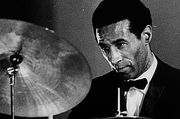Bebop was philosophy, and Max Roach was its percussive Plato. Where Art Blakey might have seemed quirky (Parmenides), or a young Roy Porter impetuous (Zeno), Roach was both an explorer and a moderator, concerned most not with individual expression, but with how the music sounded as a whole.
Phast Phreddie, always right there with the postmortem bop commentary, zeroes in on Roach’s work with Charlie Parker on “Ko Ko” in 1945 as an early example of his mastery -- the way he stirs the fast groove with understated kick-drum off-accents and breezes through a fresh solo that makes you put down your cocktail and perk up. My turn: I want to add a couple of examples from a 1951 trio session with Bud Powell on piano and Curly Russell on bass.
The first one’s the master take of “Un Poco Loco,” Powell’s rhythmically and harmonically bizarre Latin construction. Before getting it right, the trio botch a couple of takes -- totally spazzed-out on one, stitching a Frankenstein counterpoint on the other. But when they lock in, it’s ingenious. Looking to Cuba for inspiration, Roach flips into a hip-bumping tomtom pattern with one hand, while with the other he keeps up an almost unbearable tension by striking improbable yet perfect accents with the other on what sounds like a small cowbell; this is the kind of thing that would normally require the complete concentration of two separate musicians. Once this environment has materialized, Powell is cut loose to make one of his most intensely lyrical solo statements while Russell plucks a simple one-and-two-and rum-ba.
My other choice is the alternate version of “A Night in Tunisia,” more interesting than Powell’s more finished master take of the Diz classic. Unlike the then brand-new “Loco,” “Tunisia” is already a standard by ‘51, and Roach’s challenge is to make leftover goulash out of it. After toying with a cowbell effect, Roach shifts to slapping and sweeping the rhythm with brushes while dropping deliciously flatfooted bombs on the kick (disdaining the light swing most drummers have adopted for the tune from the ‘40s till now) and bringing back the cowbell for little alarm-clock alerts here and there. Powell is having a blast, and when Roach abruptly drops out in mid-clank (did he think the tape wasn’t rolling?), Powell takes nearly a minute to trail out unaccompanied, as if saying, “Hey, that was great, why’d you stop?”
Obviously I could go on forever, and I encourage comment from anyone with a favorite Max Roach moment. But I’ll just say that listeners, especially musicians, have always looked upon him with awe. Here was a man who had the imagination to keep changing throughout his life, and the technique to make his wildest imaginings real, whether stretching bebop with Clifford Brown, duetting in avantland with Archie Shepp, or working out with his long-running percussion outfit, M’Boom.
I saw Roach perform once in the ‘80s, and his attitude gave credence to observers who considered him high-minded and aloof. Humans with principles are often considered posterior irritants, and the racially militant Roach often put his principles into action, as when he formed the independent Debut Records with that other gluteal boil, Charles Mingus. Both musicians, in a lot of ways, paid a price.
It’s a curse: Maybe Roach had the misfortune to know he was the best.

